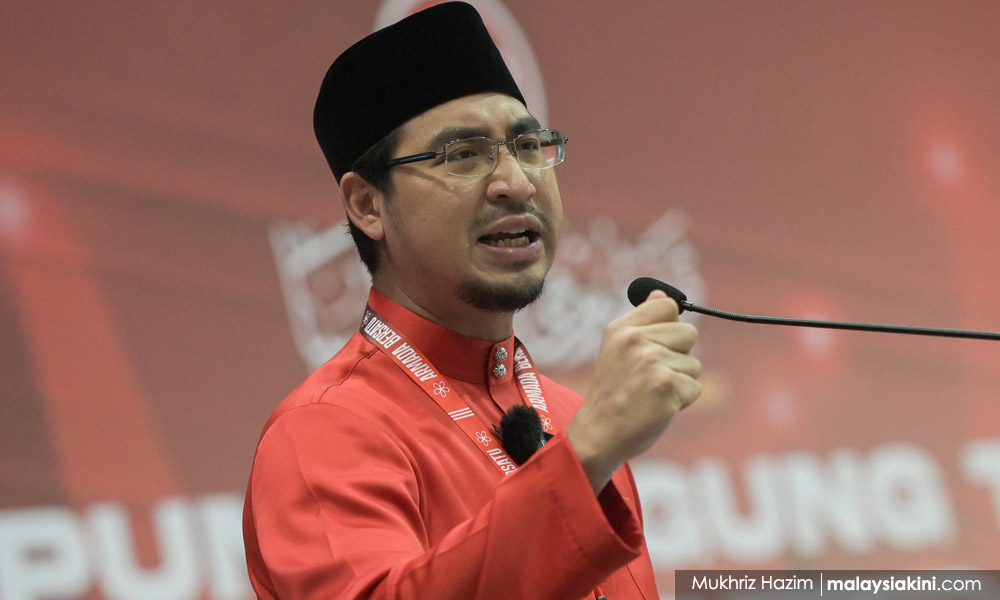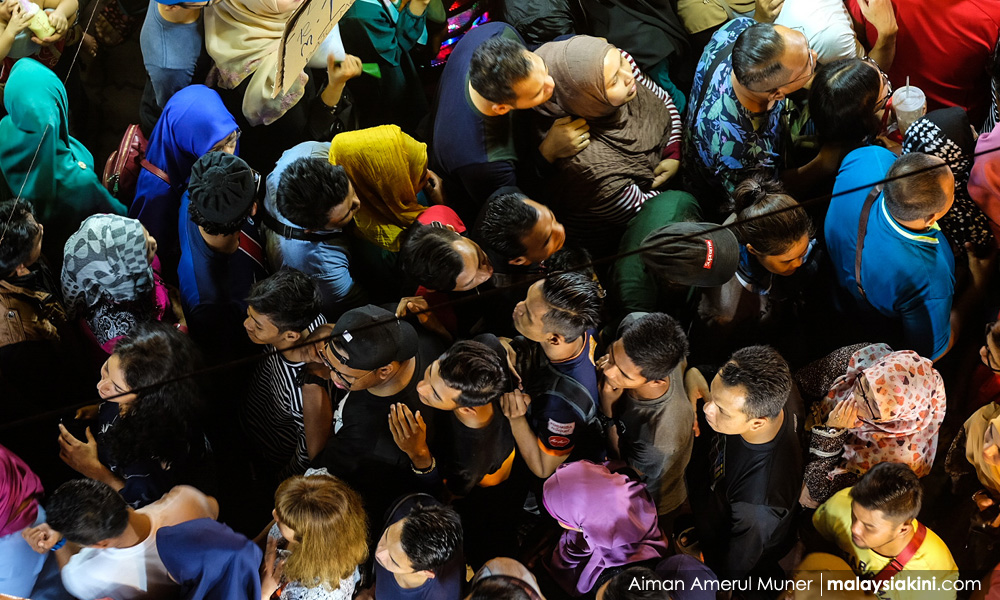Malay political elites who perpetuate the parochial blueprint that has empowered and enriched them at the expense of their race and others should be ashamed of themselves.
This is think-tank founder and businessperson Chandran Nair's searing indictment of Bersatu Youth chief Wan Ahmad Fayhsal Wan Ahmad Kamal's recent remark that the Malays, with their neo-feudal and tribal mindset, still require a protector.
For Chandran, it is extremely disappointing when the new generation of political leaders, who should be committed to emancipating the people from such cerebral manacles and racial stereotypes, reinforce antiquated beliefs which bind and hinder progress.
“It is common knowledge that in the run-up to elections, people are bought with cash and bags of rice. This tells how deplorable things are when elite Malay politicians can create a voting bloc with such a promise.
“It shows how destructive they have been to the disenfranchised within the community and why they choose to keep them poor rather than uplifting them. If this is what protection looks like, they should be ashamed of themselves,” he told Malaysiakini.
When pointed out that Wan Fayshal had, in response to critics, explained that he too disagreed with this conservative mindset, Chandran dismissed this as inadequate.
According to him, the national unity deputy minister is obliged to provide a clear explanation of why this mindset exists, what perpetuates it, and what can be done about it.

Without mincing words, Chandran said Wan Fayshal should possess the courage to swim against the current and not appear to obliquely support or pander to it.
“Don't get into politics if you are not willing to repel social structures and attitudes that prevent people from progressing and realising their potential. Do not be willing to just accept the old systems and add fuel to the fire.
“This underscores the immaturity of Malaysia's political system and many of its participants. You enter politics to make the country better. You can either be someone who is willing to pursue the old race-based politics or as a young leader say, 'that is the past and we need to move forward by dismantling it'.
“Political leaders in a multicultural society like Malaysia should not just make statements of a racial nature without offering insights that help further the search for solutions and which do not chart a course for the future.
“It is regressive to suggest that Malays have a mindset that cannot be changed. Political leaders should be helping people of all races to step out of such a race-based mindset,” he added.
A mindset that is exploited
To break free from these shackles, Chandran said the Malay community must be made to realise that such a mindset has held them back, is disadvantageous and leaves the door ajar for those who position themselves as their protectors to exploit it together with their cronies.
“Statements such as these by the political elites are sadly rooted in the untrue and misguided belief that the race is inferior to others and therefore requires protection. It reinforces racial stereotypes, including that non-Malays – especially the Chinese – are a threat. This is the type of divisive and racist politics that the country should not tolerate,” he added.
Chandran opined that many middle-class and elite Malays recognise the dangers of propagating such ideas but choose to remain silent.
“Why are they silent? Because within the elites, there are different classes that accrue different levels of benefits from the current racial construct.
“There is the rent-seeking class, who is essentially bringing this country to ruin by plundering it. Then there are others, including professionals, who are beneficiaries of the system but not the architects. We also know there are non-Malay beneficiaries who support it.
“The poorer Malays, who need the most help and whose situation is getting worse, do not seem to recognise how this system operates against them. Why? Because they have been infused with the belief that they are the 'sons of the soil' and this position is threatened by the non-Malays and therefore require protection from the elite Malays.
“The political system, economy and education system are designed to exert this sort of control on the disenfranchised Malays. So, the poor Malays, especially in rural areas, cannot know better. The irony is, they are in fact the ones being told by the elite Malays that they are inferior and are supposedly incapable of competing with non-Malays. This is the definition of racism,” he added.

The architects of this system, Chandran said, have no desire to dismantle this framework because doing so will threaten their livelihood since fortunes and entire business ecosystems have been constructed around it.
“The most unfortunate thing is when the elite Malays tell the poor Malays: ‘you are not equal to the other races but you are a special race like us and therefore, we have the right to grant ourselves all the special rights and you will also be a beneficiary’. But the truth is that poor and less educated Malays cannot leverage these perks and rights,” he added.
However, he noted that the affirmative actions designed to improve the socio-economic standing of the Malays are benefiting the rich and have failed to meet their intended targets even after several decades and iterations of the New Economic Policy (NEP).
“I have Malay friends, who opt for these benefits/discounts, saying 'you take what you can'. You are earning more than a million ringgit, and you shamelessly take this?
“There are others who are not Malay, not born in Malaysia, but have acquired the bumi status and are enjoying the largesse of this elaborate race-based Ponzi scheme.
“The state has an absolute responsibility to prevent this and needs to act urgently. That money should be going towards the poor. It should be invested in education and better teachers instead of lowering the passing rate and decimating the education system.
“If you are genuine about wanting to help the poor Malays, start with ensuring a sound education system. Provide the best education and allow them the opportunity to work hard and compete with their fellow citizens,” he added.
Chandran also admonished government-linked company (GLC) heads for being silent and therefore complicit on this matter instead of coming together to demand changes from the government.
“These GLC leaders should know better. They purport to be international business leaders at global forums etc., but in Malaysia, they behave as parochial village heads presiding over a racist system of employment,” he stressed.
The crux of the issue, he surmised, is that preserving the so-called tribal and neo-feudal mindset is crucial to ensuring the status quo and protecting the interests of the Malay elites in both politics and business.
Instutionalised racism breeds racism
Chandran also expressed regret that institutionalised racism has made Malaysians of all denominations racial in their thinking and the perception that Malays are inferior is widespread among other races.

“So non-Malays also end up seeing the Malays as not being good enough. For example, in non-Malay establishments, there are many instances when Malays are discriminated against based on the assumption that the quality of their qualifications is of a lower standard. This unacceptable form of discrimination is a function of the systemic racism of the state, which discriminates non-Malays. This is a vicious trap we are all caught in.
“The discrimination against non-Malays is also premised around the reality that the Malays don't have to compete with non-Malays for the most coveted jobs in the GLCs and the government. There is easier access to GLCs for Malays, and additionally, passing marks in education systems are lowered because of the belief that the Malays would not be able to compete otherwise.
“To ensure more Malays are ‘qualified’, the government has abetted the opening of many third-class universities which in turn offer thousands of doctorates to people who are not qualified. This breeds resentment among non-Malays, whose children are unable to secure a seat in a university despite scoring high grades. In return, Malays are unjustly discriminated against in the private sector.
“This is a serious issue, and we need more elite Malays, especially from the private sector, to speak out and give advice to the government to address this problem. If not, it will catch up with them too and destroy the nation and Malay society.
“The issue of institutional racism must be addressed because it has created economic cancer. There is hardly any meritocracy and a blind eye is turned to the pillaging. Even our banking and finance system, as far as I know, is the only one in the world which provides special funds and rates based on race,” he rued.
On an optimistic note, and responding to those who believe the rot is too entrenched, Chandran is confident that change will happen for the better.
“I get asked this question all the time, 'can it change'? It will change. It will change because society has progressed despite political elites continuing to live in the past. I meet a lot of urban working-class Malays who are ashamed of what the racist system has done to them and have come to realise that those who are truly holding them back are their political elites.
“If it doesn't change, it will be catastrophic for the country. All of us must be aware of this,” he warned. - Mkini

No comments:
Post a Comment
Note: Only a member of this blog may post a comment.